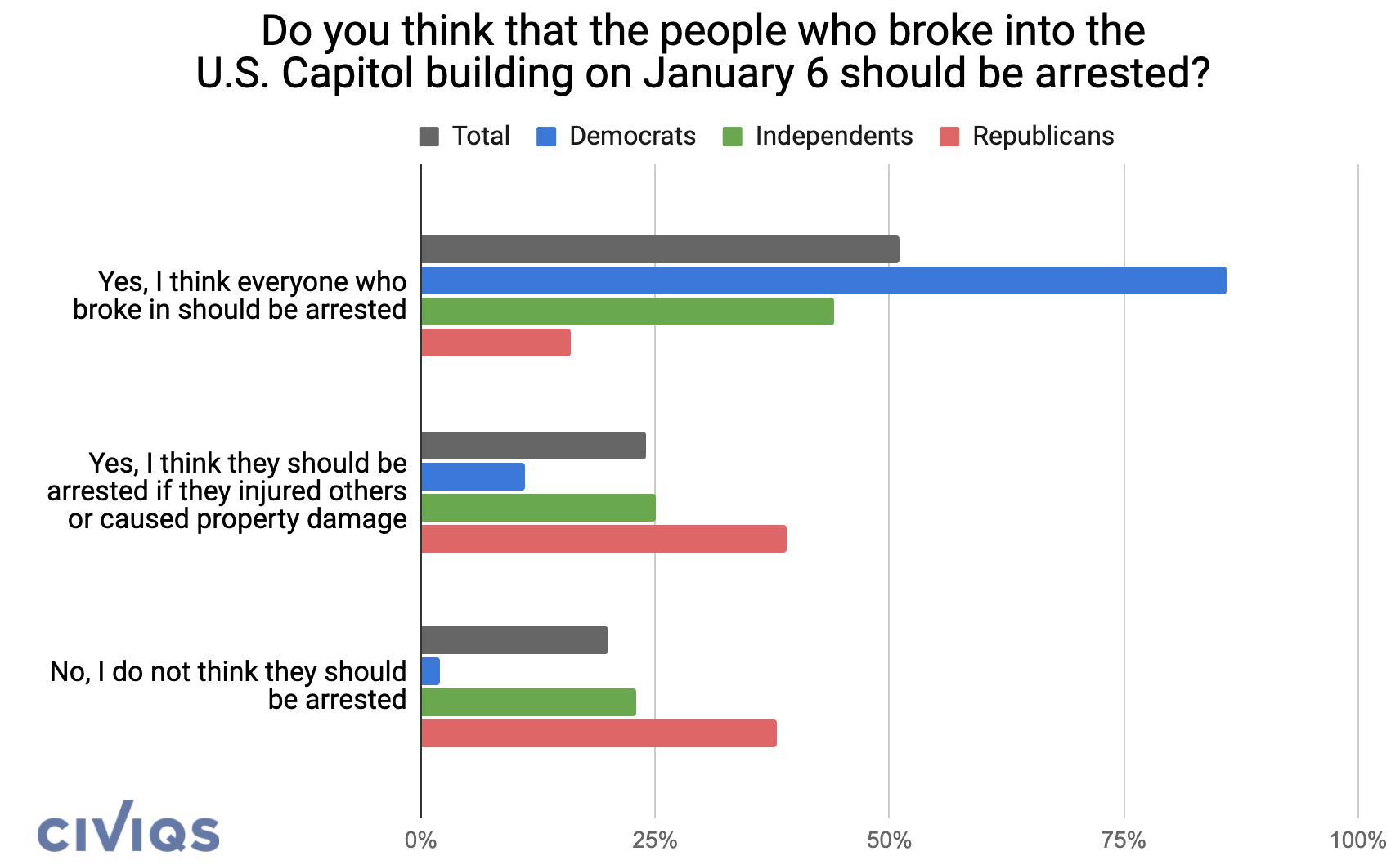Report: Republicans Increasingly Oppose Arresting U.S. Capitol Attackers
The July 2021 Daily Kos/Civiqs Poll asked 1,339 registered voters in the United States about the January 6 U.S. Capitol attack, teaching about slavery and racism, critical race theory, the COVID-19 Delta variant, the expanded child tax credit, and more.
The Attack on the U.S. Capitol
On January 6, 2021, supporters of former President Donald Trump invaded the U.S. Capitol in an attempt to overturn the 2020 presidential election. Three-quarters (73%) of Americans view the January 6 attack on the U.S. Capitol building as “generally bad,” and 50% of Americans hold Trump and other Republicans primarily responsible for the attack.
Many Republicans, however, do not share this view: 13% of Republicans now believe that what happened at the Capitol building was “generally good.” Only 5% of Republicans hold Trump responsible, with most instead blaming Joe Biden and other Democrats for the attack (41%); or saying that the invasion was “just individuals with their own agendas” (44%).
In the immediate aftermath of the invasion, 90% of Republican voters supported apprehending the people who broke into the Capitol building. Six months later, many Republicans have changed their minds: just 55% of Republican voters now support arrests. The share of Republican voters who believe that the Capitol attackers should not be arrested has increased from 8% in January to 38% now.

An overwhelming 80% of Republicans currently believe former President Trump's repeated claim that the 2020 presidential election was stolen from him. This view is shared by 40% of Independents, and 39% of Americans overall. This has held steady from January, when 40% of Americans said the election was stolen.
Democrats remain united in their attitudes towards the January 6 attack, with 97% seeking arrests, and 92% placing the majority of the blame with Donald Trump and other Republican leaders.
Teaching about Slavery and Racism
Critical race theory, an academic concept that teaches how racism is embedded in legal structures and political policy, has recently gained national attention. Most Americans (58%) say they have heard a lot about critical race theory; 33% have heard a little, and 8% have never heard of it. Frequent Fox News viewers (77%) are the group most likely to have heard a lot about the topic, followed by Republicans as a whole (71%), 59% of Independents, and 45% of Democrats.
There is a stark partisan division on support and opposition for critical race theory. Among Democrats, 65% support and 8% oppose. Among Republicans, 2% support and 89% oppose.
Separately from their attitudes towards “critical race theory,” Americans overwhelmingly believe that the history of slavery should be taught in schools, either as a major topic (55%) or a minor topic (41%). Where 83% of Democrats think slavery should be taught as a major topic, 68% of Republicans believe it should be a minor topic. Eight out of ten (79%) Black Americans and 68% of Hispanic Americans think it should be a major topic in schools.
Americans diverge when asked if history classes should teach about racism in the United States. While three-quarters (75%) think it should be taught as a major or minor topic, 22% of Americans do not think that schools should teach about racism at all, including 42% of Republicans and 24% of Independents.
COVID-19 and Vaccination
Over half of Americans (52%) are either very worried (25%) or somewhat worried (27%) about the COVID-19 Delta variant. This includes 87% of Democrats, 49% of Independents, and 14% of Republicans. The intensity of concern varies by region: while a third (32%) of Americans in urban areas are very worried, only 26% of suburban and 17% of rural Americans are. Younger Americans are also less concerned: while 32% of voters age 65 or older are very worried, only 15% of those 18-34 are.
Over three-quarters (82%) of Americans think that it is very or somewhat important for children to receive vaccines for diseases other than COVID-19, including 97% of Democrats, 75% of Independents, and 71% of Republicans. However, one in ten voters (11%) do not think vaccination is important at all.
Civiqs surveyed 1,339 registered voters in the United States from July 24-27, 2021. The survey was conducted online, among selected members of the Civiqs research panel. Sampled individuals were emailed by Civiqs and responded using a personalized link to the survey at civiqs.com. The survey results are weighted by age, race, gender, education, party identification, and region to be representative of the population of registered voters in the United States. The general design effect due to weighting is 1.08. The survey has a margin of error of ±2.8% at the 95% confidence level, accounting for the design effect.
Download the survey methodology and crosstabs
Interested in conducting a survey? Speak with a Civiqs Analyst.
Want Civiqs updates in your inbox? Sign up for our newsletter, Immediate Reaction.